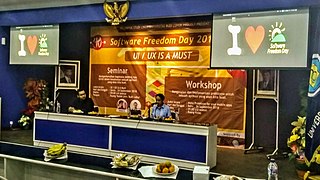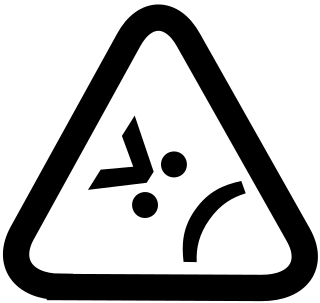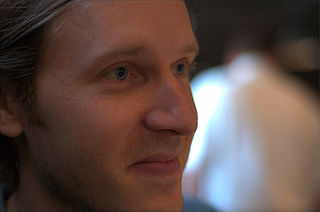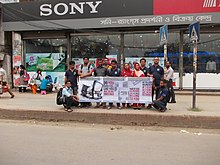The free software movement is a social movement with the goal of obtaining and guaranteeing certain freedoms for software users, namely the freedoms to run, study, modify, and share copies of software. Software which meets these requirements, The Four Essential Freedoms of Free Software, is termed free software.

The Free Software Foundation Europe e.V. (FSFE) is an organization that supports free software and all aspects of the free software movement in Europe, with registered chapters in several European countries. It is a registered voluntary association incorporated under German law.

The Free Software Foundation (FSF) grants two annual awards. Since 1998, FSF has granted the award for Advancement of Free Software and since 2005, also the Free Software Award for Projects of Social Benefit.

Software Freedom Day (SFD) is an annual worldwide celebration of Free Software organized by the Digital Freedom Foundation (DFF). SFD is a public education effort with the aim of increasing awareness of Free Software and its virtues, and encouraging its use.

Free and open-source software (FOSS) is software that is available under a license that grants the right to use, modify, and distribute the software, modified or not, to everyone free of charge. The public availability of the source code is, therefore, a necessary but not sufficient condition. FOSS is an inclusive umbrella term for free software and open-source software. FOSS is in contrast to proprietary software, where the software is under restrictive copyright or licensing and the source code is hidden from the users.
World Intellectual Property Day is observed annually on 26 April. The event was established by the World Intellectual Property Organization (WIPO) in 2000 to "raise awareness of how patents, copyright, trademarks and designs impact on daily life" and "to celebrate creativity, and the contribution made by creators and innovators to the development of economies and societies across the globe". 26 April was chosen as the date for World Intellectual Property Day because it coincides with the date on which the Convention Establishing the World Intellectual Property Organization entered into force in 1970. World Intellectual Property Day is WIPO’s largest intellectual property (IP) public outreach campaign.

The free-culture movement is a social movement that promotes the freedom to distribute and modify the creative works of others in the form of free content or open content without compensation to, or the consent of, the work's original creators, by using the Internet and other forms of media.

Richard Matthew Stallman, also known by his initials, rms, is an American free software movement activist and programmer. He campaigns for software to be distributed in such a manner that its users have the freedom to use, study, distribute, and modify that software. Software which ensures these freedoms is termed free software. Stallman launched the GNU Project, founded the Free Software Foundation (FSF) in October 1985, developed the GNU Compiler Collection and GNU Emacs, and wrote all versions of the GNU General Public License.
Tivoization is the practice of designing hardware that incorporates software under the terms of a copyleft software license like the GNU General Public License, but uses hardware restrictions or digital rights management (DRM) to prevent users from running modified versions of the software on that hardware. Richard Stallman of the Free Software Foundation (FSF) coined the term in reference to TiVo's use of GNU GPL licensed software on the TiVo brand digital video recorders (DVR), which actively block modified software by design. Stallman believes this practice denies users some of the freedom that the GNU GPL was designed to protect. The FSF refers to tivoized hardware as "proprietary tyrants".

Defective by Design (DBD) is a grassroots anti-digital rights management (DRM) initiative by the Free Software Foundation (FSF) and CivicActions. Launched in 2006, DBD believes that DRM makes technology deliberately defective, negatively affects digital freedoms, and is "a threat to innovation in media, the privacy of readers, and freedom for computer users." The initiative regularly campaigns against the use of DRM by the media industry and software industry to increase awareness of the anti-DRM movement and pressure industries into no longer using DRM. They are known for their use of hazmat suits in their demonstrations.

William John Sullivan is a software freedom activist, hacker, and writer. John was formerly executive director of the Free Software Foundation (FSF), where he has worked since early 2003. He is also a speaker and webmaster for the GNU Project. He also maintains the Plannermode and delicious-el packages for the GNU Emacs text editor.
Free Software Foundation anti-Windows campaigns are the events targeted against a line of Microsoft Windows operating systems. They are paralleling the Defective by Design campaign against digital rights management technologies, but they instead target Microsoft's operating systems instead of DRM itself.
Digital rights management (DRM) is the management of legal access to digital content. Various tools or technological protection measures (TPM), such as access control technologies, can restrict the use of proprietary hardware and copyrighted works. DRM technologies govern the use, modification and distribution of copyrighted works and of systems that enforce these policies within devices. DRM technologies include licensing agreements and encryption.

The GNU General Public Licenses are a series of widely used free software licenses, or copyleft licenses, that guarantee end users the freedoms to run, study, share, and modify the software. The license was the first copyleft for general use and was originally written by Richard Stallman, the founder of the Free Software Foundation (FSF), for the GNU Project. The license grants the recipients of a computer program the rights of the Free Software Definition. The licenses in the GPL series are all copyleft licenses, which means that any derivative work must be distributed under the same or equivalent license terms. It is more restrictive than the Lesser General Public License and even further distinct from the more widely-used permissive software licenses such as BSD, MIT, and Apache.

The GNU Free Documentation License is a copyleft license for free documentation, designed by the Free Software Foundation (FSF) for the GNU Project. It is similar to the GNU General Public License, giving readers the rights to copy, redistribute, and modify a work and requires all copies and derivatives to be available under the same license. Copies may also be sold commercially, but, if produced in larger quantities, the original document or source code must be made available to the work's recipient.
The Free Software Foundation (FSF) is a 501(c)(3) non-profit organization founded by Richard Stallman on October 4, 1985, to support the free software movement, with the organization's preference for software being distributed under copyleft terms, such as with its own GNU General Public License. The FSF was incorporated in Boston, Massachusetts, United States, where it is also based.

Free Software, Free Society: Selected Essays of Richard M. Stallman is a collection of writings by Richard Stallman. It introduces the subject of history and development of the GNU Project and the Free Software Foundation, explains the author's philosophical position on the Free Software movement, deals with the topics of software ethics, copyright and patent laws, as well as business practices in application to computer software. The author proposes Free software licenses as a solution to social issues created by proprietary software and described in essays.
Digital Freedom Foundation (DFF) is a non-profit organization established in 2004. The group is the lead organizer of Software Freedom Day, and Hardware Freedom Day, as well as other "digital freedom days".

LibreCMC is a Linux-libre distribution for computers with minimal resources, such as the Ben NanoNote, ath9k-based Wi-Fi routers, and other hardware with emphasis on free software. Based on OpenWrt, the project's goal is to aim for compliance with the GNU Free System Distribution Guidelines and ensure that the project continues to meet these requirements set forth by the Free Software Foundation (FSF). LibreCMC does not support ac or ax due to a lack of free chipsets.
CivicActions, Inc. is a services firm that provides technological support with a focus on free and open-source software to agencies.














